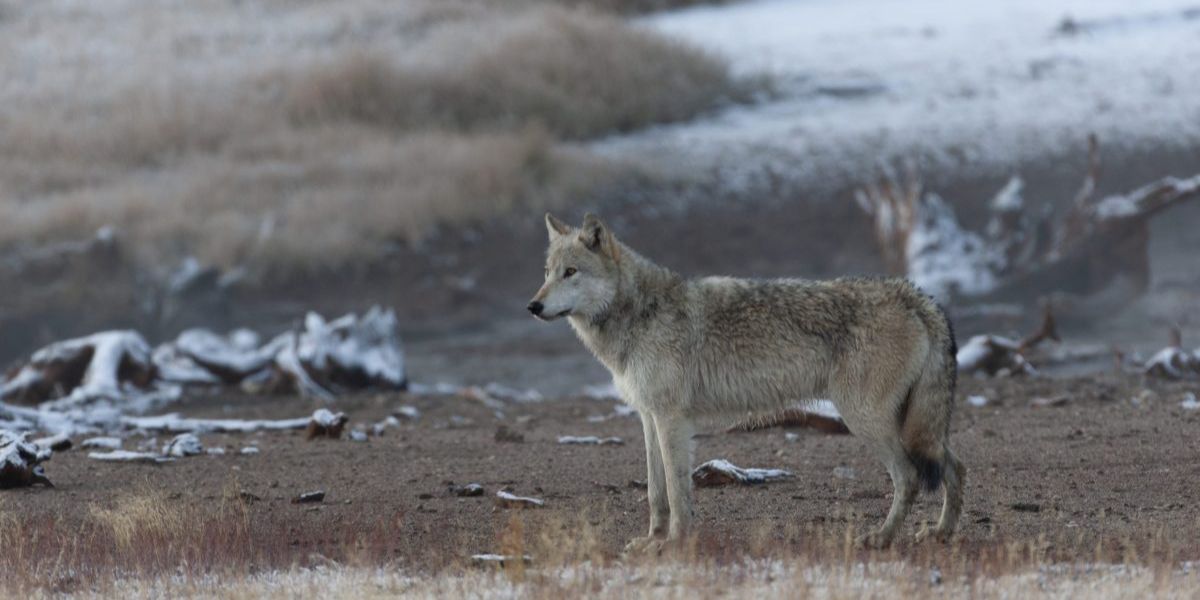Environmental Groups Sue to Restore Protections for Northern Rockies Wolves
Environmental groups filed two lawsuits on Monday challenging the US Fish and Wildlife Service’s decision not to reinstate federal protections for Northern Rockies wolves.
The groups are requesting that the court overturn the USFWS’ February determination that federal safeguards are unnecessary and conduct a fresh examination that prioritizes the impact of human-caused mortality on canid species.
The complaints, both filed in federal court, contend that the USFWS relied on inaccurate population projections and overestimated the impact of aggressive wolf-reduction tactics in Idaho, Montana, and Wyoming when it judged the restoration of Endangered Species Act protections for Northern Rockies wolves unjustified.
The USFWS claimed that its decision not to relist Northern Rockies wolves was based on a review of “the best available data” from federal, state, and tribal agencies, academic institutions, and the public. The number and distribution of gray wolves, together with the population’s genetic variety, indicate that wolves are not in danger of extinction “now or in the foreseeable future,” the agency discovered.
Western Watersheds Project, WildEarth Guardians, Alliance for the Wild Rockies, Trap Free Montana, Wilderness Watch, and five other groups are challenging that assessment, arguing in a press release that it “ignores obvious threats to the species, runs contrary to the best available science, and relies on flawed population models for its determination.”
“The Biden administration and its Fish and Wildlife Service are complicit in the horrific war on wolves being waged by the states of Idaho, Wyoming, and Montana,” Wilderness Watch Executive Director George Nickas said in a statement. “Idaho is battling to expand airstrips across the backcountry, even designated Wilderness areas, to allow more hunters to shoot wolves in their most isolated habitats.
Montana is turning to night hunting and shooting over bait, while Wyoming has simply declared an open season. It’s bad that residents must go to the courts, but it appears that federal officials, like their state counterparts, have lost all awe and respect for these famous wilderness animals.
The complaint focuses on regulations and statutes passed by politicians in Montana, Idaho, and Wyoming in recent years. It also claims that estimates from Montana Fish, Wildlife, and Parks’ preferred methodology, the Integrated Patch Occupancy methodology (iPOM), “are biased and result in population estimation errors” by underestimating territory size and pack numbers within a given area.
Western Watersheds and the co-plaintiffs are asking the court to overturn the USFWS’ Feb. 7 judgment because it is “arbitrary, capricious, an abuse of discretion, and not under the ESA” and to conduct a new examination.
A separate lawsuit filed Monday by the Center for Biological Diversity, the Humane Society of the United States, the Humane Society Legislative Fund, and the Sierra Club makes similar claims: that the federal government reached a “irrational conclusion” that was “based on unfounded assumptions” and a “failure to consider and apply the best available science.”
Margie Robinson, an attorney with the Humane Society of the United States, said in a press release that the federal government has failed to rein in state governments that are submitting to pressure from powerful anti-predator organizations.
“Under the Endangered Species Act, the U.S Fish and Wildlife Service cannot ignore crucial scientific findings,” Robinson said. “Rather than allow states to cater to trophy hunters, trappers, and ranchers, the agency must ensure the preservation of wolves — who are vital to ensuring healthy ecosystems — for generations to come.”
According to Montana Fish, Wildlife and Parks spokeswoman Greg Lemon, the department has not yet evaluated the lawsuits, which were both filed in Missoula District Court.
“Our attention is focused on managing wolves in Montana,” Lemon said, adding that FWP expects to make a final decision on its draft wolf management plan in the coming months.
That strategy avoided setting a minimum or maximum wolf population target, instead stating that it would “manage wolves with the primary objective of maintaining a healthy, sustainable population above the federal ESA listing criteria (15 breeding pairs or 450 wolves).”










